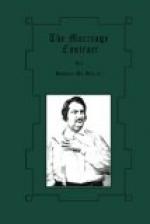Solonet was the style of young notary who comes in humming a tune, affects light-heartedness, declares that business is better done with a laugh than seriously. He is the notary captain of the national guard, who dislikes to be taken for a notary, solicits the cross of the Legion of honor, keeps his cabriolet, and leaves the verification of his deeds to his clerks; he is the notary who goes to balls and theatres, buys pictures and plays at ecarte; he has coffers in which gold is received on deposit and is later returned in bank-bills,—a notary who follows his epoch, risks capital in doubtful investments, speculates with all he can lay his hands on, and expects to retire with an income of thirty thousand francs after ten years’ practice; in short, the notary whose cleverness comes of his duplicity, whom many men fear as an accomplice possessing their secrets, and who sees in his practice a means of ultimately marrying some blue-stockinged heiress.
When the slender, fair-haired Solonet, curled, perfumed, and booted like the leading gentleman at the Vaudeville, and dressed like a dandy whose most important business is a duel, entered Madame Evangelista’s salon, preceding his brother notary, whose advance was delayed by a twinge of the gout, the two men presented to the life one of those famous caricatures entitled “Former Times and the Present Day,” which had such eminent success under the Empire. If Madame and Mademoiselle Evangelista to whom the “good Monsieur Mathias,” was personally unknown, felt, on first seeing him, a slight inclination to laugh, they were soon touched by the old-fashioned grace with which he greeted them. The words he used were full of that amenity which amiable old men convey as much by the ideas they suggest as by the manner in which they express them. The younger notary, with his flippant tone, seemed on a lower plane. Mathias showed his superior knowledge of life by the reserved manner with which he accosted Paul. Without compromising his white hairs, he showed that he respected the young man’s nobility, while at the same time he claimed the honor due to old age, and made it felt that social rights are natural. Solonet’s bow and greeting, on the contrary,




